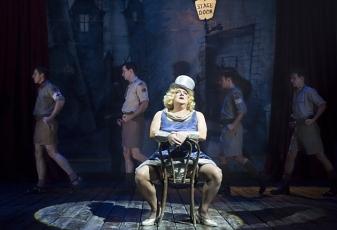Privates On Parade Review
This is a revival of a musical play, first aired in 1977, written by Peter Nichols with music by Dennis King. 'Privates on Parade' won the Evening Standard Award for best comedy in the same year as it was premiered, and here it is the first production in a new season of five plays stretching over 15 months at the Noël Coward Theatre, directed by Michael Grandage.
Peter Nichols drew heavily on his own experiences to write this show which is based on an armed services entertainment unit. Many people might be familiar with the organisation called ENSA, set up in 1939 to provide entertainment for British troops. By the end of the Second World War, ENSA had been replaced by CSE (Combined Services Entertainment) and it was this service which provided Mr Nichols with the material to write this play.
When Private Steven Flowers (Joseph Timms) turns-up to start his new posting with SADUSEA (Song And Dance Unit, South East Asia) he finds himself in the 'middle-sex regiment' - one which is populated by numerous gay soldier-actors, described by some of the soldiers in rather more derogatory terms which I won't bother to repeat here, but which reflect, of course, attitudes of the time. In charge of the entertainment is Acting Captain Terri Dennis, played by Simon Russell Beale. Captain Dennis wears the frocks in the unit's shows, dressing-up as Carmen Miranda, but he wears lipstick and nail varnish even when off-stage. Though Captain Dennis is responsible for the entertainment, the unit is commanded by the vaguely sinister and somewhat dangerous Major Giles Flack (Angus Wright) who counsels his soldiers against blasphemy and luxury and undertakes a rather ludicrous attempt to lead his unit against local insurgents. And, to further demonstrate the fact that this is no ordinary entertainment unit, the Sergeant Major (Mark Lewis Jones) is involved with dubious deals with the locals, selling off army supplies and the like.
On one level, 'Privates On Parade' could be seen as a light-hearted romp, but there is another, more serious side to the play. In Mr Nichols's complex plot, we find as much drama as humour. In fact, though there are moments of sheer comic delight, this is not a raucously funny play and intentionally so. The ending is rather melancholic, even if there is a certain predictability about it. Mr Nichols warns of the dangers of war in its many forms, and we see the brutal effects of war on vulnerable individuals. For example, in Sophiya Haque's Sylvia we find a woman cast aside by her British lover when she becomes pregnant with his child, and we hear of the doubts and bitterness of the ordinary solider (and perhaps British citizen) who fails to understand why and how Britain seemed to have lost the war. 'Privates on Parade' might have won an award for best comedy, but it would be too simplistic to describe it merely as a comedy because it has elements of tragedy as well as moments of quite powerful drama - an intelligent combination which is both enjoyable and thought-provoking.
What the popular press had to say...
"Joyous revival...it offers a heady mix of personal memoir, musical parody and jaundiced account of postwar colonial politics "
Michael Billington for The Guardian
"Outstanding production is also blessed with an irresistible star performance from Simon Russell Beale...Gloriously entertaining and often deeply touching"
Charles Spencer for The Daily Telegraph
"Brims with both warmth and extravagance...The show needs a small amount of tightening, and some will find it dated, perhaps even a period piece. But Privates on Parade is a lovely picture of the ways in which the ordinary business of military life is intertwined with agonies and absurdities."
Henry Hitchings for Evening Standard
Originally published on
